Reward System Impact on Employee Performance
VerifiedAdded on 2020/01/28
|16
|5595
|334
Thesis and Dissertation
AI Summary
This dissertation investigates the impact of reward systems on employee performance, using Asda as a case study. It begins with a literature review exploring the concept of reward systems, their importance, different types (intrinsic/extrinsic, financial/non-financial), and the factors influencing employee compensation. The methodology section details the research philosophy (positivism), approach (deductive), design (descriptive), and methods (qualitative, using thematic analysis of survey data from Asda managers and secondary data from published sources). Ethical considerations, including prior approval and confidentiality, are addressed. The study aims to understand how reward systems influence employee performance and identify factors affecting compensation within the organization.
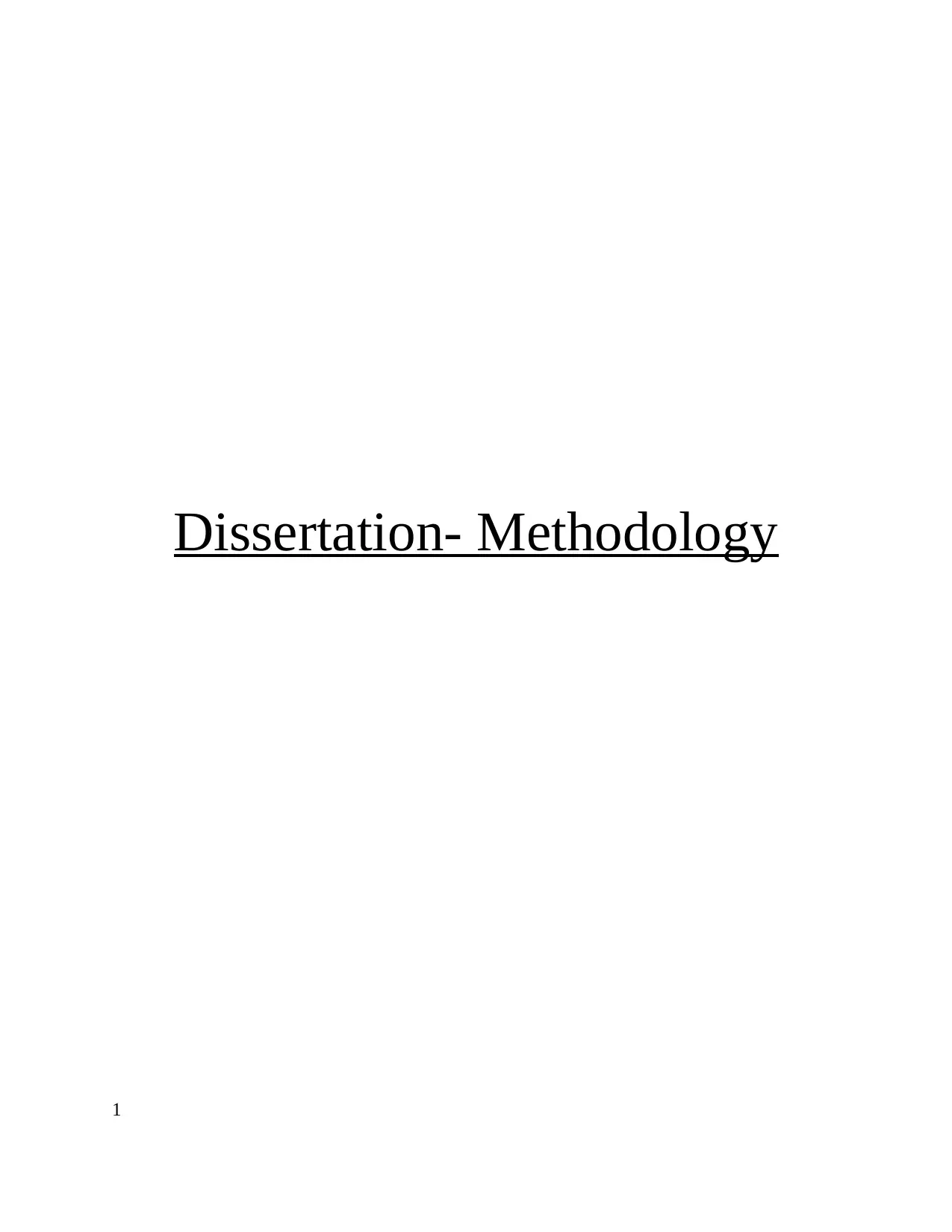
Dissertation- Methodology
1
1
Paraphrase This Document
Need a fresh take? Get an instant paraphrase of this document with our AI Paraphraser
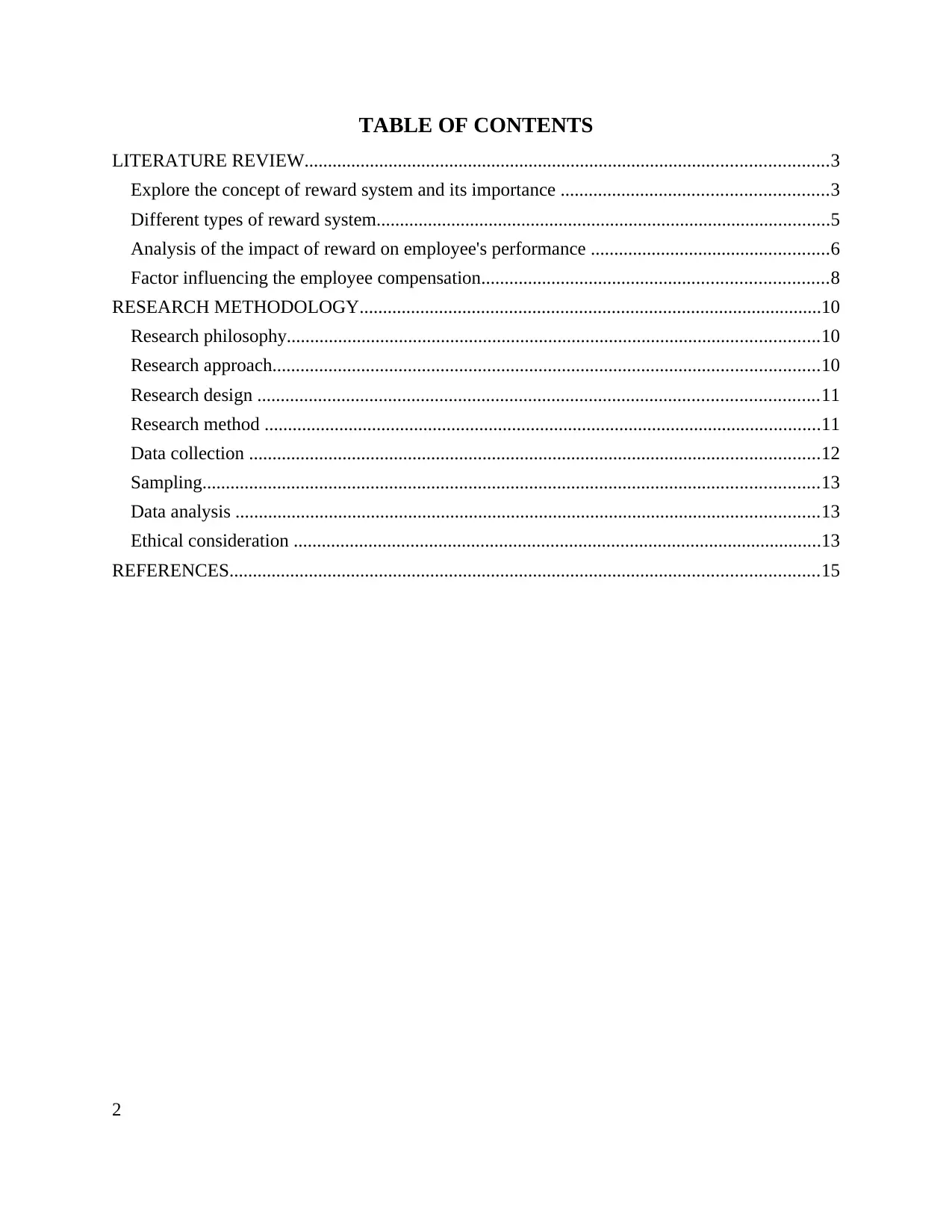
TABLE OF CONTENTS
LITERATURE REVIEW................................................................................................................3
Explore the concept of reward system and its importance .........................................................3
Different types of reward system.................................................................................................5
Analysis of the impact of reward on employee's performance ...................................................6
Factor influencing the employee compensation..........................................................................8
RESEARCH METHODOLOGY...................................................................................................10
Research philosophy..................................................................................................................10
Research approach.....................................................................................................................10
Research design ........................................................................................................................11
Research method .......................................................................................................................11
Data collection ..........................................................................................................................12
Sampling....................................................................................................................................13
Data analysis .............................................................................................................................13
Ethical consideration .................................................................................................................13
REFERENCES..............................................................................................................................15
2
LITERATURE REVIEW................................................................................................................3
Explore the concept of reward system and its importance .........................................................3
Different types of reward system.................................................................................................5
Analysis of the impact of reward on employee's performance ...................................................6
Factor influencing the employee compensation..........................................................................8
RESEARCH METHODOLOGY...................................................................................................10
Research philosophy..................................................................................................................10
Research approach.....................................................................................................................10
Research design ........................................................................................................................11
Research method .......................................................................................................................11
Data collection ..........................................................................................................................12
Sampling....................................................................................................................................13
Data analysis .............................................................................................................................13
Ethical consideration .................................................................................................................13
REFERENCES..............................................................................................................................15
2
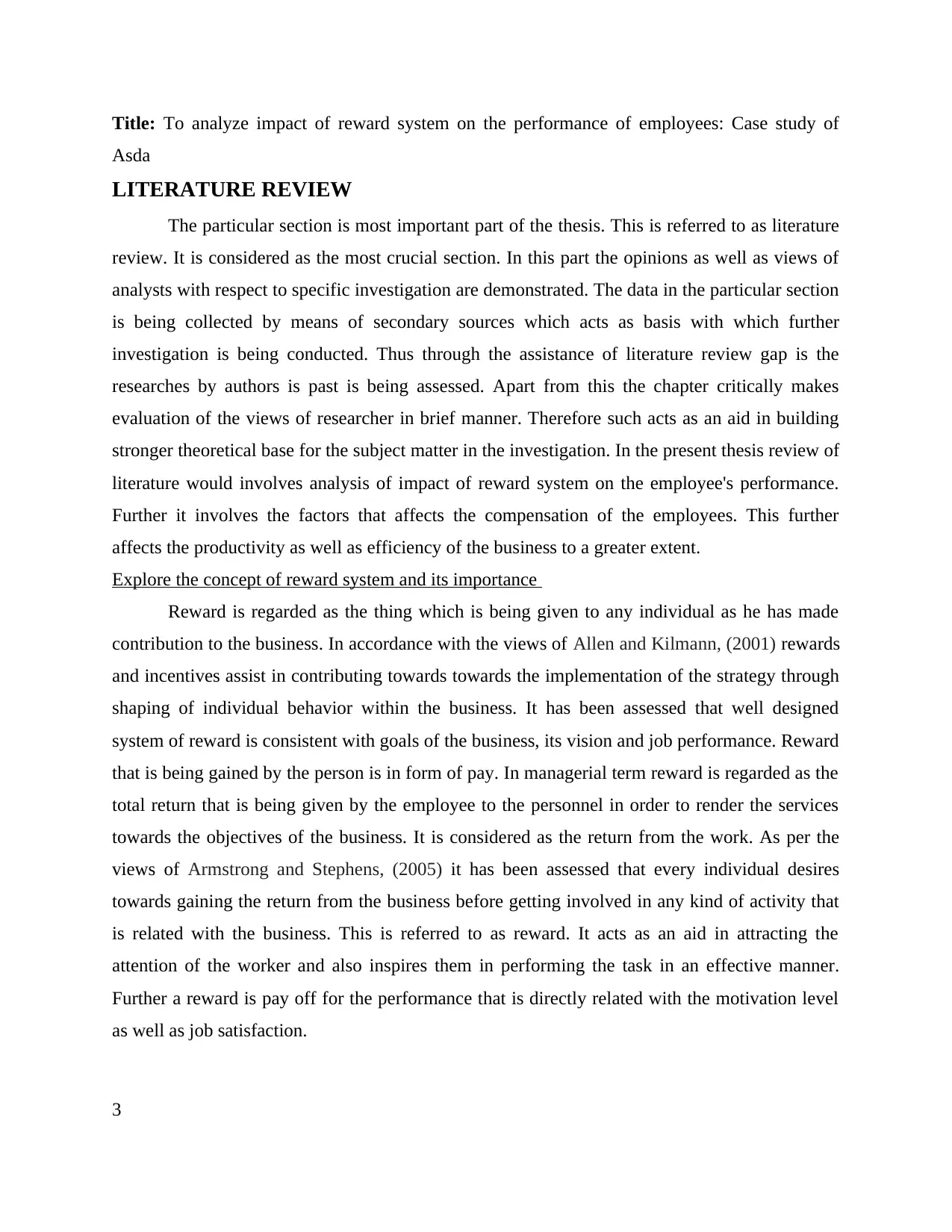
Title: To analyze impact of reward system on the performance of employees: Case study of
Asda
LITERATURE REVIEW
The particular section is most important part of the thesis. This is referred to as literature
review. It is considered as the most crucial section. In this part the opinions as well as views of
analysts with respect to specific investigation are demonstrated. The data in the particular section
is being collected by means of secondary sources which acts as basis with which further
investigation is being conducted. Thus through the assistance of literature review gap is the
researches by authors is past is being assessed. Apart from this the chapter critically makes
evaluation of the views of researcher in brief manner. Therefore such acts as an aid in building
stronger theoretical base for the subject matter in the investigation. In the present thesis review of
literature would involves analysis of impact of reward system on the employee's performance.
Further it involves the factors that affects the compensation of the employees. This further
affects the productivity as well as efficiency of the business to a greater extent.
Explore the concept of reward system and its importance
Reward is regarded as the thing which is being given to any individual as he has made
contribution to the business. In accordance with the views of Allen and Kilmann, (2001) rewards
and incentives assist in contributing towards towards the implementation of the strategy through
shaping of individual behavior within the business. It has been assessed that well designed
system of reward is consistent with goals of the business, its vision and job performance. Reward
that is being gained by the person is in form of pay. In managerial term reward is regarded as the
total return that is being given by the employee to the personnel in order to render the services
towards the objectives of the business. It is considered as the return from the work. As per the
views of Armstrong and Stephens, (2005) it has been assessed that every individual desires
towards gaining the return from the business before getting involved in any kind of activity that
is related with the business. This is referred to as reward. It acts as an aid in attracting the
attention of the worker and also inspires them in performing the task in an effective manner.
Further a reward is pay off for the performance that is directly related with the motivation level
as well as job satisfaction.
3
Asda
LITERATURE REVIEW
The particular section is most important part of the thesis. This is referred to as literature
review. It is considered as the most crucial section. In this part the opinions as well as views of
analysts with respect to specific investigation are demonstrated. The data in the particular section
is being collected by means of secondary sources which acts as basis with which further
investigation is being conducted. Thus through the assistance of literature review gap is the
researches by authors is past is being assessed. Apart from this the chapter critically makes
evaluation of the views of researcher in brief manner. Therefore such acts as an aid in building
stronger theoretical base for the subject matter in the investigation. In the present thesis review of
literature would involves analysis of impact of reward system on the employee's performance.
Further it involves the factors that affects the compensation of the employees. This further
affects the productivity as well as efficiency of the business to a greater extent.
Explore the concept of reward system and its importance
Reward is regarded as the thing which is being given to any individual as he has made
contribution to the business. In accordance with the views of Allen and Kilmann, (2001) rewards
and incentives assist in contributing towards towards the implementation of the strategy through
shaping of individual behavior within the business. It has been assessed that well designed
system of reward is consistent with goals of the business, its vision and job performance. Reward
that is being gained by the person is in form of pay. In managerial term reward is regarded as the
total return that is being given by the employee to the personnel in order to render the services
towards the objectives of the business. It is considered as the return from the work. As per the
views of Armstrong and Stephens, (2005) it has been assessed that every individual desires
towards gaining the return from the business before getting involved in any kind of activity that
is related with the business. This is referred to as reward. It acts as an aid in attracting the
attention of the worker and also inspires them in performing the task in an effective manner.
Further a reward is pay off for the performance that is directly related with the motivation level
as well as job satisfaction.
3
⊘ This is a preview!⊘
Do you want full access?
Subscribe today to unlock all pages.

Trusted by 1+ million students worldwide
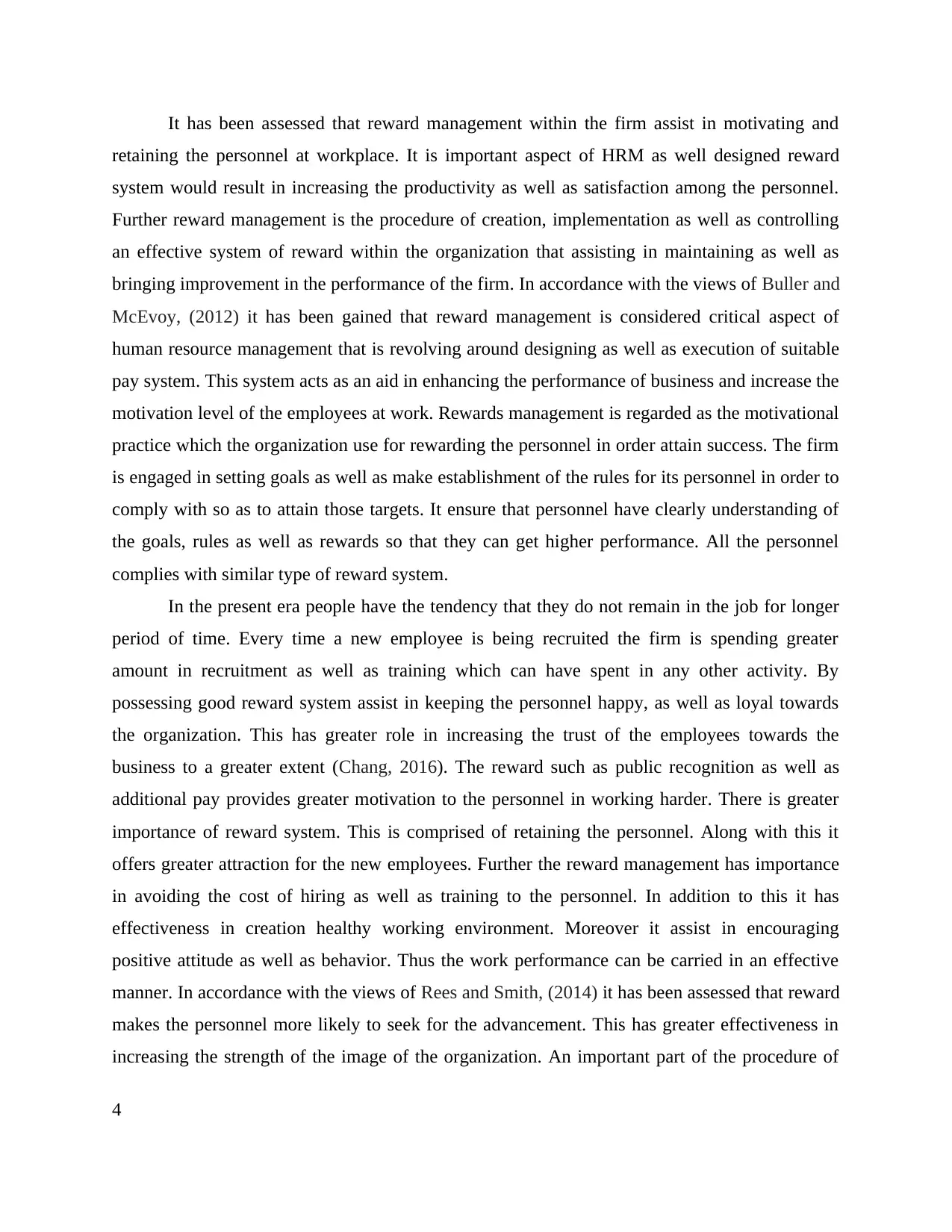
It has been assessed that reward management within the firm assist in motivating and
retaining the personnel at workplace. It is important aspect of HRM as well designed reward
system would result in increasing the productivity as well as satisfaction among the personnel.
Further reward management is the procedure of creation, implementation as well as controlling
an effective system of reward within the organization that assisting in maintaining as well as
bringing improvement in the performance of the firm. In accordance with the views of Buller and
McEvoy, (2012) it has been gained that reward management is considered critical aspect of
human resource management that is revolving around designing as well as execution of suitable
pay system. This system acts as an aid in enhancing the performance of business and increase the
motivation level of the employees at work. Rewards management is regarded as the motivational
practice which the organization use for rewarding the personnel in order attain success. The firm
is engaged in setting goals as well as make establishment of the rules for its personnel in order to
comply with so as to attain those targets. It ensure that personnel have clearly understanding of
the goals, rules as well as rewards so that they can get higher performance. All the personnel
complies with similar type of reward system.
In the present era people have the tendency that they do not remain in the job for longer
period of time. Every time a new employee is being recruited the firm is spending greater
amount in recruitment as well as training which can have spent in any other activity. By
possessing good reward system assist in keeping the personnel happy, as well as loyal towards
the organization. This has greater role in increasing the trust of the employees towards the
business to a greater extent (Chang, 2016). The reward such as public recognition as well as
additional pay provides greater motivation to the personnel in working harder. There is greater
importance of reward system. This is comprised of retaining the personnel. Along with this it
offers greater attraction for the new employees. Further the reward management has importance
in avoiding the cost of hiring as well as training to the personnel. In addition to this it has
effectiveness in creation healthy working environment. Moreover it assist in encouraging
positive attitude as well as behavior. Thus the work performance can be carried in an effective
manner. In accordance with the views of Rees and Smith, (2014) it has been assessed that reward
makes the personnel more likely to seek for the advancement. This has greater effectiveness in
increasing the strength of the image of the organization. An important part of the procedure of
4
retaining the personnel at workplace. It is important aspect of HRM as well designed reward
system would result in increasing the productivity as well as satisfaction among the personnel.
Further reward management is the procedure of creation, implementation as well as controlling
an effective system of reward within the organization that assisting in maintaining as well as
bringing improvement in the performance of the firm. In accordance with the views of Buller and
McEvoy, (2012) it has been gained that reward management is considered critical aspect of
human resource management that is revolving around designing as well as execution of suitable
pay system. This system acts as an aid in enhancing the performance of business and increase the
motivation level of the employees at work. Rewards management is regarded as the motivational
practice which the organization use for rewarding the personnel in order attain success. The firm
is engaged in setting goals as well as make establishment of the rules for its personnel in order to
comply with so as to attain those targets. It ensure that personnel have clearly understanding of
the goals, rules as well as rewards so that they can get higher performance. All the personnel
complies with similar type of reward system.
In the present era people have the tendency that they do not remain in the job for longer
period of time. Every time a new employee is being recruited the firm is spending greater
amount in recruitment as well as training which can have spent in any other activity. By
possessing good reward system assist in keeping the personnel happy, as well as loyal towards
the organization. This has greater role in increasing the trust of the employees towards the
business to a greater extent (Chang, 2016). The reward such as public recognition as well as
additional pay provides greater motivation to the personnel in working harder. There is greater
importance of reward system. This is comprised of retaining the personnel. Along with this it
offers greater attraction for the new employees. Further the reward management has importance
in avoiding the cost of hiring as well as training to the personnel. In addition to this it has
effectiveness in creation healthy working environment. Moreover it assist in encouraging
positive attitude as well as behavior. Thus the work performance can be carried in an effective
manner. In accordance with the views of Rees and Smith, (2014) it has been assessed that reward
makes the personnel more likely to seek for the advancement. This has greater effectiveness in
increasing the strength of the image of the organization. An important part of the procedure of
4
Paraphrase This Document
Need a fresh take? Get an instant paraphrase of this document with our AI Paraphraser
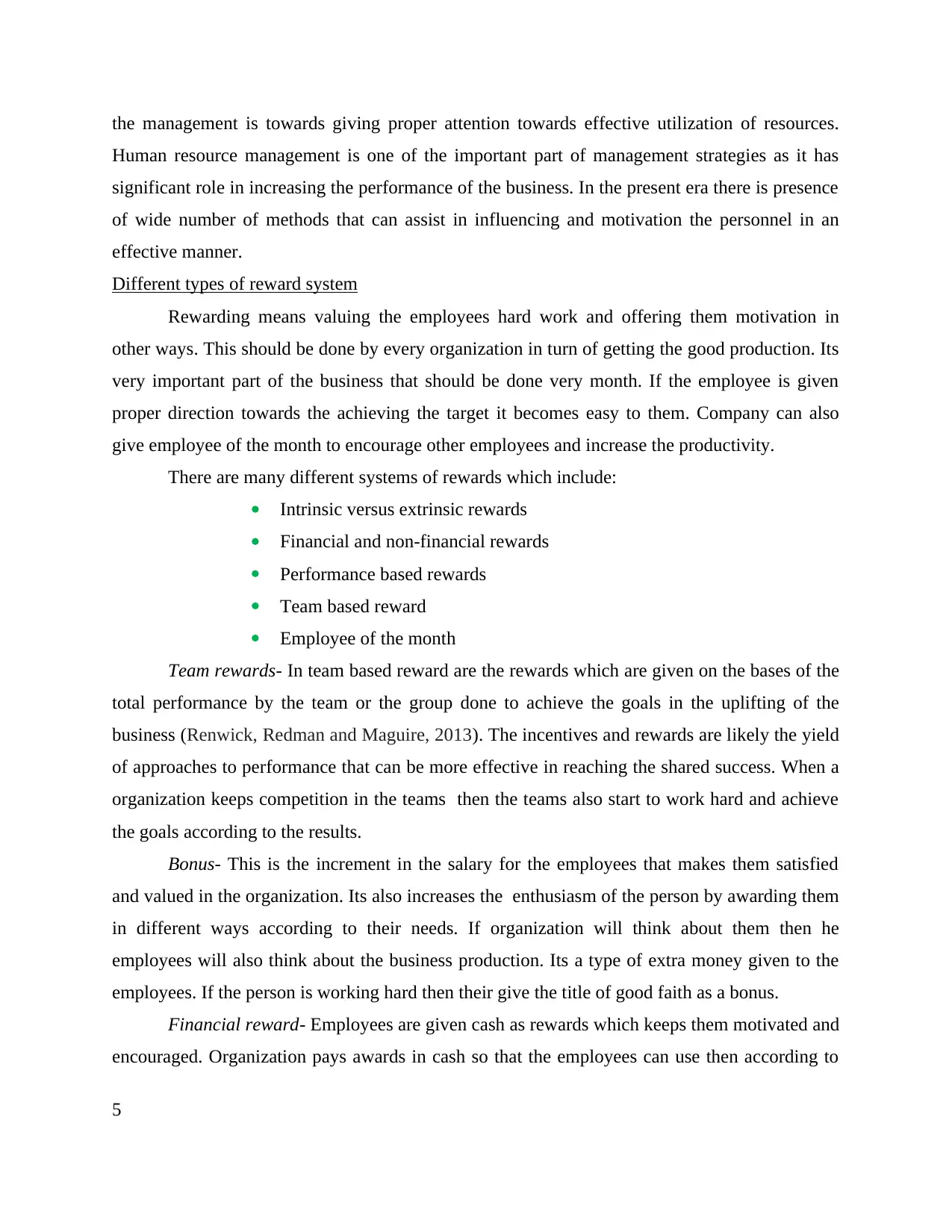
the management is towards giving proper attention towards effective utilization of resources.
Human resource management is one of the important part of management strategies as it has
significant role in increasing the performance of the business. In the present era there is presence
of wide number of methods that can assist in influencing and motivation the personnel in an
effective manner.
Different types of reward system
Rewarding means valuing the employees hard work and offering them motivation in
other ways. This should be done by every organization in turn of getting the good production. Its
very important part of the business that should be done very month. If the employee is given
proper direction towards the achieving the target it becomes easy to them. Company can also
give employee of the month to encourage other employees and increase the productivity.
There are many different systems of rewards which include:
Intrinsic versus extrinsic rewards
Financial and non-financial rewards
Performance based rewards
Team based reward
Employee of the month
Team rewards- In team based reward are the rewards which are given on the bases of the
total performance by the team or the group done to achieve the goals in the uplifting of the
business (Renwick, Redman and Maguire, 2013). The incentives and rewards are likely the yield
of approaches to performance that can be more effective in reaching the shared success. When a
organization keeps competition in the teams then the teams also start to work hard and achieve
the goals according to the results.
Bonus- This is the increment in the salary for the employees that makes them satisfied
and valued in the organization. Its also increases the enthusiasm of the person by awarding them
in different ways according to their needs. If organization will think about them then he
employees will also think about the business production. Its a type of extra money given to the
employees. If the person is working hard then their give the title of good faith as a bonus.
Financial reward- Employees are given cash as rewards which keeps them motivated and
encouraged. Organization pays awards in cash so that the employees can use then according to
5
Human resource management is one of the important part of management strategies as it has
significant role in increasing the performance of the business. In the present era there is presence
of wide number of methods that can assist in influencing and motivation the personnel in an
effective manner.
Different types of reward system
Rewarding means valuing the employees hard work and offering them motivation in
other ways. This should be done by every organization in turn of getting the good production. Its
very important part of the business that should be done very month. If the employee is given
proper direction towards the achieving the target it becomes easy to them. Company can also
give employee of the month to encourage other employees and increase the productivity.
There are many different systems of rewards which include:
Intrinsic versus extrinsic rewards
Financial and non-financial rewards
Performance based rewards
Team based reward
Employee of the month
Team rewards- In team based reward are the rewards which are given on the bases of the
total performance by the team or the group done to achieve the goals in the uplifting of the
business (Renwick, Redman and Maguire, 2013). The incentives and rewards are likely the yield
of approaches to performance that can be more effective in reaching the shared success. When a
organization keeps competition in the teams then the teams also start to work hard and achieve
the goals according to the results.
Bonus- This is the increment in the salary for the employees that makes them satisfied
and valued in the organization. Its also increases the enthusiasm of the person by awarding them
in different ways according to their needs. If organization will think about them then he
employees will also think about the business production. Its a type of extra money given to the
employees. If the person is working hard then their give the title of good faith as a bonus.
Financial reward- Employees are given cash as rewards which keeps them motivated and
encouraged. Organization pays awards in cash so that the employees can use then according to
5
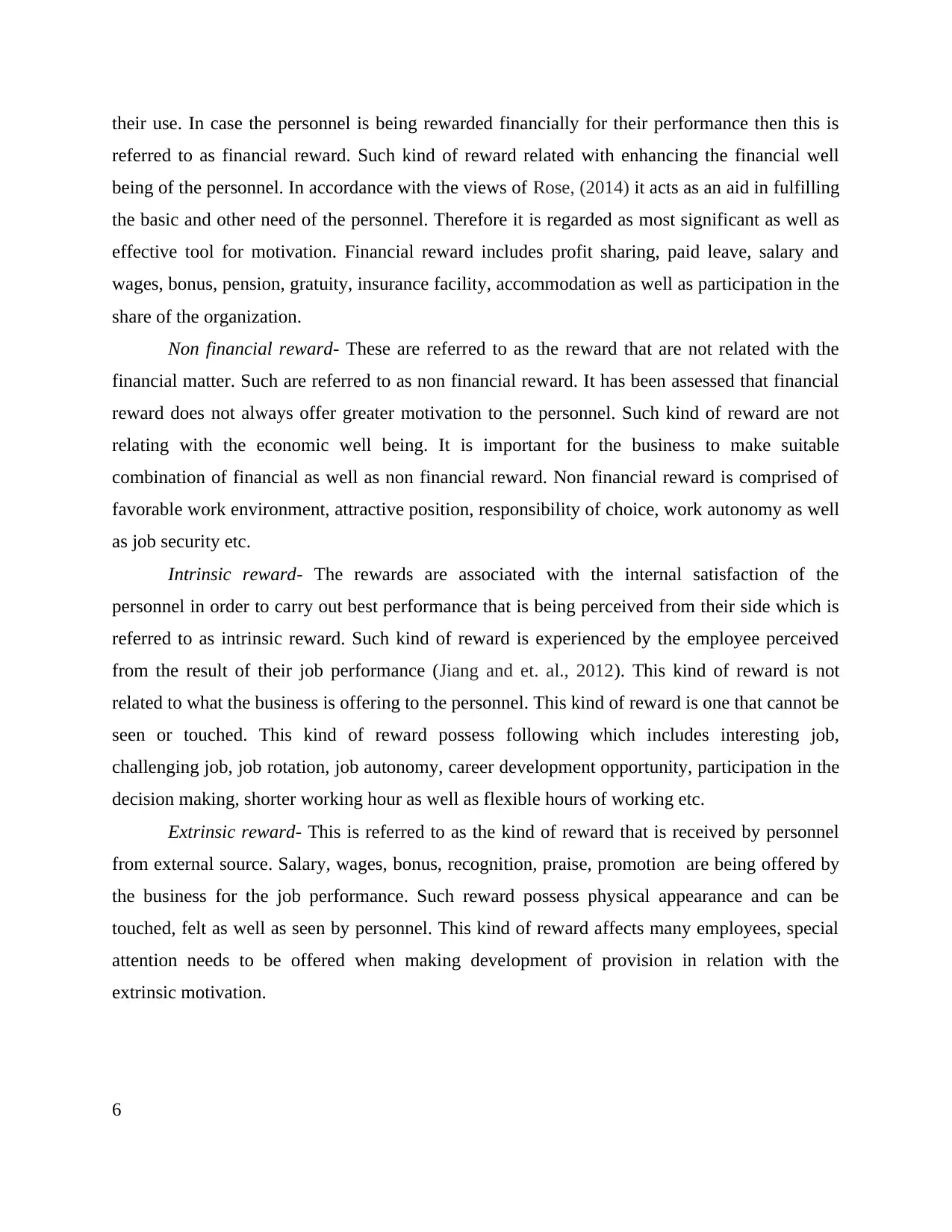
their use. In case the personnel is being rewarded financially for their performance then this is
referred to as financial reward. Such kind of reward related with enhancing the financial well
being of the personnel. In accordance with the views of Rose, (2014) it acts as an aid in fulfilling
the basic and other need of the personnel. Therefore it is regarded as most significant as well as
effective tool for motivation. Financial reward includes profit sharing, paid leave, salary and
wages, bonus, pension, gratuity, insurance facility, accommodation as well as participation in the
share of the organization.
Non financial reward- These are referred to as the reward that are not related with the
financial matter. Such are referred to as non financial reward. It has been assessed that financial
reward does not always offer greater motivation to the personnel. Such kind of reward are not
relating with the economic well being. It is important for the business to make suitable
combination of financial as well as non financial reward. Non financial reward is comprised of
favorable work environment, attractive position, responsibility of choice, work autonomy as well
as job security etc.
Intrinsic reward- The rewards are associated with the internal satisfaction of the
personnel in order to carry out best performance that is being perceived from their side which is
referred to as intrinsic reward. Such kind of reward is experienced by the employee perceived
from the result of their job performance (Jiang and et. al., 2012). This kind of reward is not
related to what the business is offering to the personnel. This kind of reward is one that cannot be
seen or touched. This kind of reward possess following which includes interesting job,
challenging job, job rotation, job autonomy, career development opportunity, participation in the
decision making, shorter working hour as well as flexible hours of working etc.
Extrinsic reward- This is referred to as the kind of reward that is received by personnel
from external source. Salary, wages, bonus, recognition, praise, promotion are being offered by
the business for the job performance. Such reward possess physical appearance and can be
touched, felt as well as seen by personnel. This kind of reward affects many employees, special
attention needs to be offered when making development of provision in relation with the
extrinsic motivation.
6
referred to as financial reward. Such kind of reward related with enhancing the financial well
being of the personnel. In accordance with the views of Rose, (2014) it acts as an aid in fulfilling
the basic and other need of the personnel. Therefore it is regarded as most significant as well as
effective tool for motivation. Financial reward includes profit sharing, paid leave, salary and
wages, bonus, pension, gratuity, insurance facility, accommodation as well as participation in the
share of the organization.
Non financial reward- These are referred to as the reward that are not related with the
financial matter. Such are referred to as non financial reward. It has been assessed that financial
reward does not always offer greater motivation to the personnel. Such kind of reward are not
relating with the economic well being. It is important for the business to make suitable
combination of financial as well as non financial reward. Non financial reward is comprised of
favorable work environment, attractive position, responsibility of choice, work autonomy as well
as job security etc.
Intrinsic reward- The rewards are associated with the internal satisfaction of the
personnel in order to carry out best performance that is being perceived from their side which is
referred to as intrinsic reward. Such kind of reward is experienced by the employee perceived
from the result of their job performance (Jiang and et. al., 2012). This kind of reward is not
related to what the business is offering to the personnel. This kind of reward is one that cannot be
seen or touched. This kind of reward possess following which includes interesting job,
challenging job, job rotation, job autonomy, career development opportunity, participation in the
decision making, shorter working hour as well as flexible hours of working etc.
Extrinsic reward- This is referred to as the kind of reward that is received by personnel
from external source. Salary, wages, bonus, recognition, praise, promotion are being offered by
the business for the job performance. Such reward possess physical appearance and can be
touched, felt as well as seen by personnel. This kind of reward affects many employees, special
attention needs to be offered when making development of provision in relation with the
extrinsic motivation.
6
⊘ This is a preview!⊘
Do you want full access?
Subscribe today to unlock all pages.

Trusted by 1+ million students worldwide
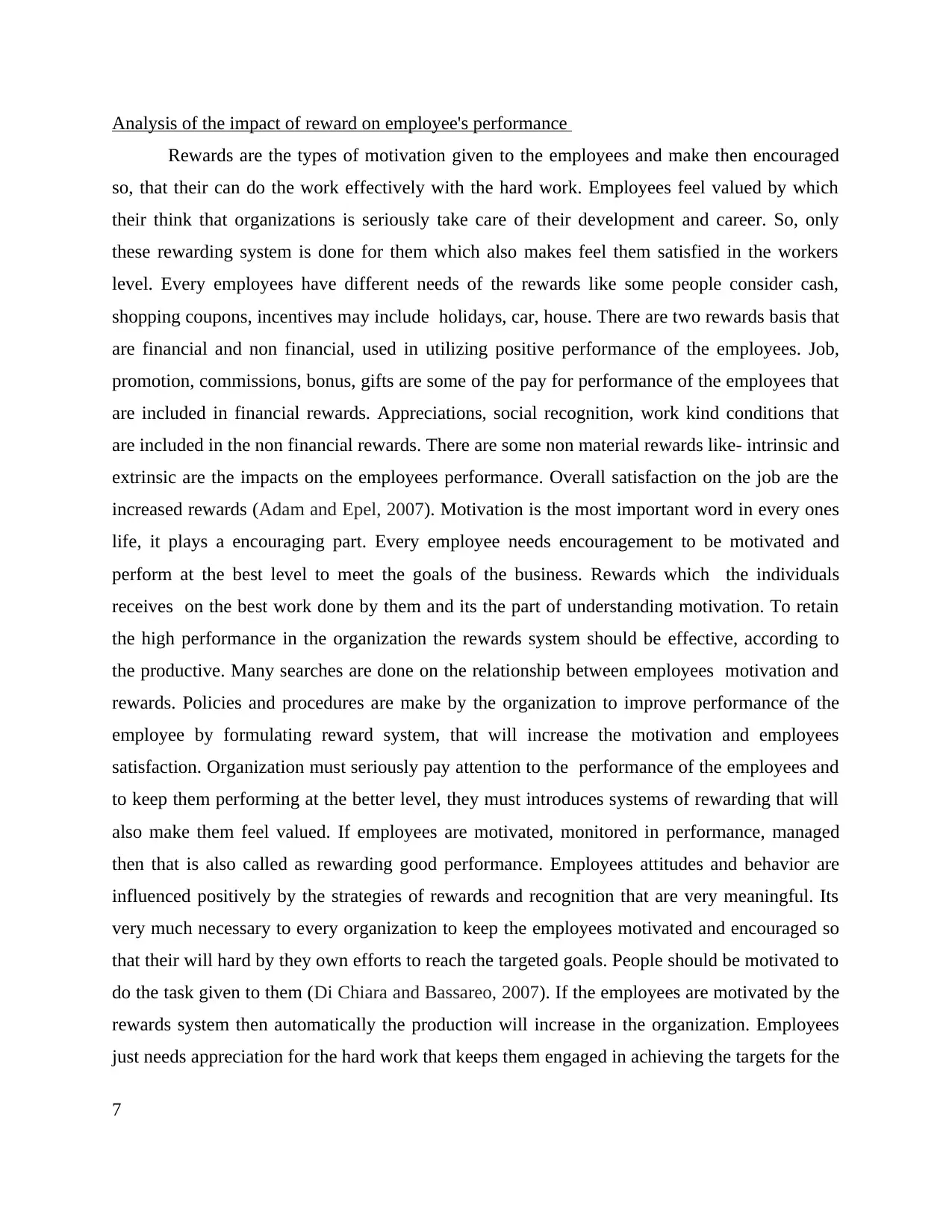
Analysis of the impact of reward on employee's performance
Rewards are the types of motivation given to the employees and make then encouraged
so, that their can do the work effectively with the hard work. Employees feel valued by which
their think that organizations is seriously take care of their development and career. So, only
these rewarding system is done for them which also makes feel them satisfied in the workers
level. Every employees have different needs of the rewards like some people consider cash,
shopping coupons, incentives may include holidays, car, house. There are two rewards basis that
are financial and non financial, used in utilizing positive performance of the employees. Job,
promotion, commissions, bonus, gifts are some of the pay for performance of the employees that
are included in financial rewards. Appreciations, social recognition, work kind conditions that
are included in the non financial rewards. There are some non material rewards like- intrinsic and
extrinsic are the impacts on the employees performance. Overall satisfaction on the job are the
increased rewards (Adam and Epel, 2007). Motivation is the most important word in every ones
life, it plays a encouraging part. Every employee needs encouragement to be motivated and
perform at the best level to meet the goals of the business. Rewards which the individuals
receives on the best work done by them and its the part of understanding motivation. To retain
the high performance in the organization the rewards system should be effective, according to
the productive. Many searches are done on the relationship between employees motivation and
rewards. Policies and procedures are make by the organization to improve performance of the
employee by formulating reward system, that will increase the motivation and employees
satisfaction. Organization must seriously pay attention to the performance of the employees and
to keep them performing at the better level, they must introduces systems of rewarding that will
also make them feel valued. If employees are motivated, monitored in performance, managed
then that is also called as rewarding good performance. Employees attitudes and behavior are
influenced positively by the strategies of rewards and recognition that are very meaningful. Its
very much necessary to every organization to keep the employees motivated and encouraged so
that their will hard by they own efforts to reach the targeted goals. People should be motivated to
do the task given to them (Di Chiara and Bassareo, 2007). If the employees are motivated by the
rewards system then automatically the production will increase in the organization. Employees
just needs appreciation for the hard work that keeps them engaged in achieving the targets for the
7
Rewards are the types of motivation given to the employees and make then encouraged
so, that their can do the work effectively with the hard work. Employees feel valued by which
their think that organizations is seriously take care of their development and career. So, only
these rewarding system is done for them which also makes feel them satisfied in the workers
level. Every employees have different needs of the rewards like some people consider cash,
shopping coupons, incentives may include holidays, car, house. There are two rewards basis that
are financial and non financial, used in utilizing positive performance of the employees. Job,
promotion, commissions, bonus, gifts are some of the pay for performance of the employees that
are included in financial rewards. Appreciations, social recognition, work kind conditions that
are included in the non financial rewards. There are some non material rewards like- intrinsic and
extrinsic are the impacts on the employees performance. Overall satisfaction on the job are the
increased rewards (Adam and Epel, 2007). Motivation is the most important word in every ones
life, it plays a encouraging part. Every employee needs encouragement to be motivated and
perform at the best level to meet the goals of the business. Rewards which the individuals
receives on the best work done by them and its the part of understanding motivation. To retain
the high performance in the organization the rewards system should be effective, according to
the productive. Many searches are done on the relationship between employees motivation and
rewards. Policies and procedures are make by the organization to improve performance of the
employee by formulating reward system, that will increase the motivation and employees
satisfaction. Organization must seriously pay attention to the performance of the employees and
to keep them performing at the better level, they must introduces systems of rewarding that will
also make them feel valued. If employees are motivated, monitored in performance, managed
then that is also called as rewarding good performance. Employees attitudes and behavior are
influenced positively by the strategies of rewards and recognition that are very meaningful. Its
very much necessary to every organization to keep the employees motivated and encouraged so
that their will hard by they own efforts to reach the targeted goals. People should be motivated to
do the task given to them (Di Chiara and Bassareo, 2007). If the employees are motivated by the
rewards system then automatically the production will increase in the organization. Employees
just needs appreciation for the hard work that keeps them engaged in achieving the targets for the
7
Paraphrase This Document
Need a fresh take? Get an instant paraphrase of this document with our AI Paraphraser
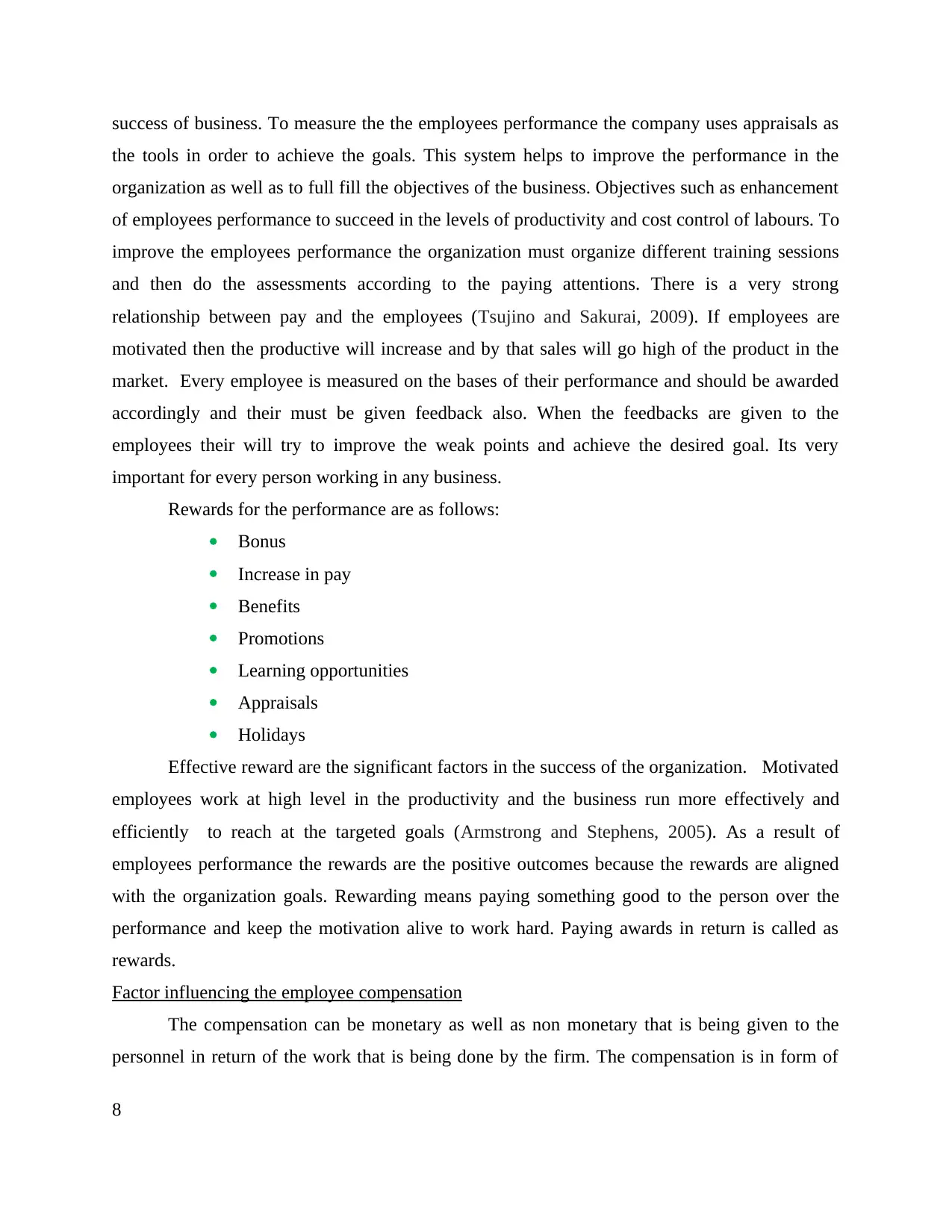
success of business. To measure the the employees performance the company uses appraisals as
the tools in order to achieve the goals. This system helps to improve the performance in the
organization as well as to full fill the objectives of the business. Objectives such as enhancement
of employees performance to succeed in the levels of productivity and cost control of labours. To
improve the employees performance the organization must organize different training sessions
and then do the assessments according to the paying attentions. There is a very strong
relationship between pay and the employees (Tsujino and Sakurai, 2009). If employees are
motivated then the productive will increase and by that sales will go high of the product in the
market. Every employee is measured on the bases of their performance and should be awarded
accordingly and their must be given feedback also. When the feedbacks are given to the
employees their will try to improve the weak points and achieve the desired goal. Its very
important for every person working in any business.
Rewards for the performance are as follows:
Bonus
Increase in pay
Benefits
Promotions
Learning opportunities
Appraisals
Holidays
Effective reward are the significant factors in the success of the organization. Motivated
employees work at high level in the productivity and the business run more effectively and
efficiently to reach at the targeted goals (Armstrong and Stephens, 2005). As a result of
employees performance the rewards are the positive outcomes because the rewards are aligned
with the organization goals. Rewarding means paying something good to the person over the
performance and keep the motivation alive to work hard. Paying awards in return is called as
rewards.
Factor influencing the employee compensation
The compensation can be monetary as well as non monetary that is being given to the
personnel in return of the work that is being done by the firm. The compensation is in form of
8
the tools in order to achieve the goals. This system helps to improve the performance in the
organization as well as to full fill the objectives of the business. Objectives such as enhancement
of employees performance to succeed in the levels of productivity and cost control of labours. To
improve the employees performance the organization must organize different training sessions
and then do the assessments according to the paying attentions. There is a very strong
relationship between pay and the employees (Tsujino and Sakurai, 2009). If employees are
motivated then the productive will increase and by that sales will go high of the product in the
market. Every employee is measured on the bases of their performance and should be awarded
accordingly and their must be given feedback also. When the feedbacks are given to the
employees their will try to improve the weak points and achieve the desired goal. Its very
important for every person working in any business.
Rewards for the performance are as follows:
Bonus
Increase in pay
Benefits
Promotions
Learning opportunities
Appraisals
Holidays
Effective reward are the significant factors in the success of the organization. Motivated
employees work at high level in the productivity and the business run more effectively and
efficiently to reach at the targeted goals (Armstrong and Stephens, 2005). As a result of
employees performance the rewards are the positive outcomes because the rewards are aligned
with the organization goals. Rewarding means paying something good to the person over the
performance and keep the motivation alive to work hard. Paying awards in return is called as
rewards.
Factor influencing the employee compensation
The compensation can be monetary as well as non monetary that is being given to the
personnel in return of the work that is being done by the firm. The compensation is in form of
8
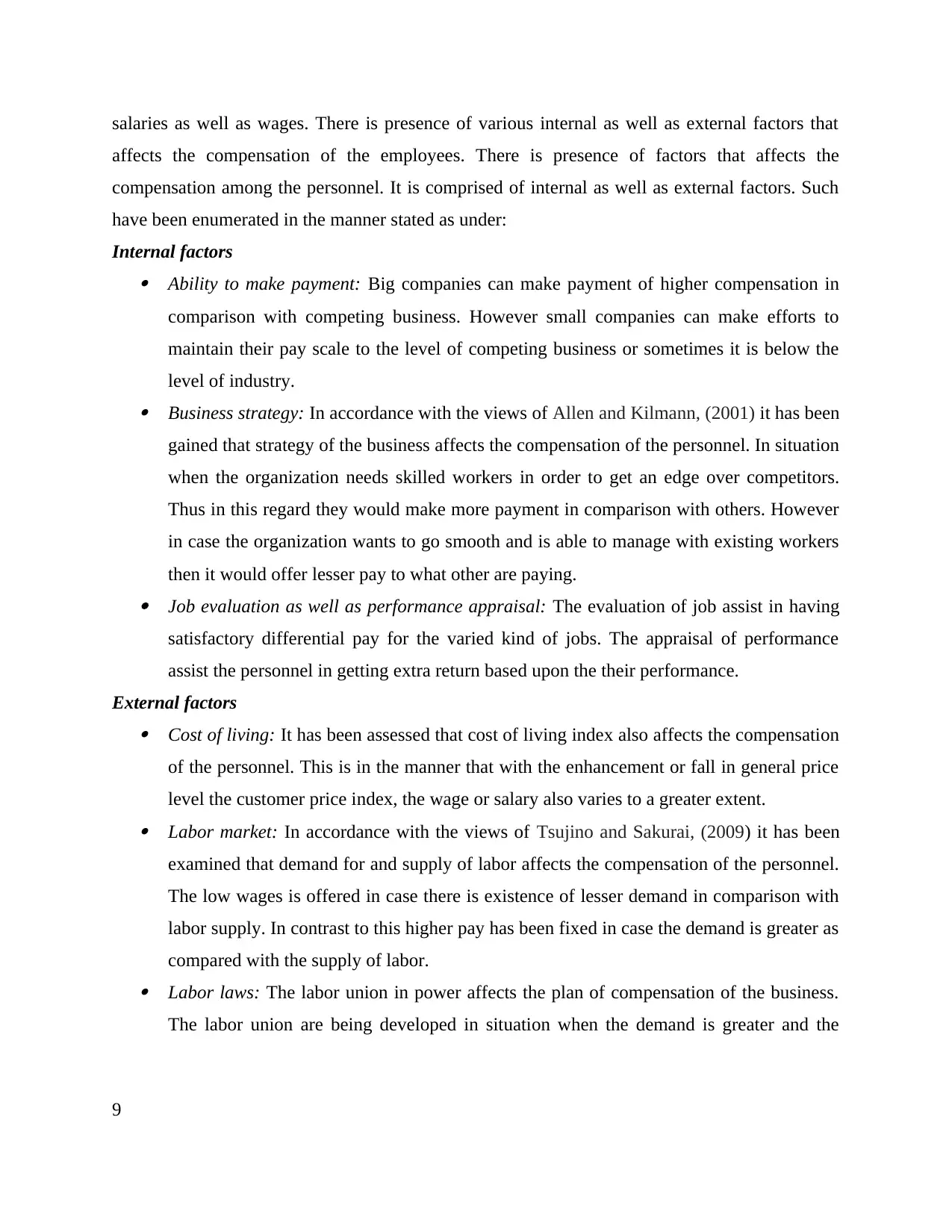
salaries as well as wages. There is presence of various internal as well as external factors that
affects the compensation of the employees. There is presence of factors that affects the
compensation among the personnel. It is comprised of internal as well as external factors. Such
have been enumerated in the manner stated as under:
Internal factors Ability to make payment: Big companies can make payment of higher compensation in
comparison with competing business. However small companies can make efforts to
maintain their pay scale to the level of competing business or sometimes it is below the
level of industry. Business strategy: In accordance with the views of Allen and Kilmann, (2001) it has been
gained that strategy of the business affects the compensation of the personnel. In situation
when the organization needs skilled workers in order to get an edge over competitors.
Thus in this regard they would make more payment in comparison with others. However
in case the organization wants to go smooth and is able to manage with existing workers
then it would offer lesser pay to what other are paying. Job evaluation as well as performance appraisal: The evaluation of job assist in having
satisfactory differential pay for the varied kind of jobs. The appraisal of performance
assist the personnel in getting extra return based upon the their performance.
External factors Cost of living: It has been assessed that cost of living index also affects the compensation
of the personnel. This is in the manner that with the enhancement or fall in general price
level the customer price index, the wage or salary also varies to a greater extent. Labor market: In accordance with the views of Tsujino and Sakurai, (2009) it has been
examined that demand for and supply of labor affects the compensation of the personnel.
The low wages is offered in case there is existence of lesser demand in comparison with
labor supply. In contrast to this higher pay has been fixed in case the demand is greater as
compared with the supply of labor. Labor laws: The labor union in power affects the plan of compensation of the business.
The labor union are being developed in situation when the demand is greater and the
9
affects the compensation of the employees. There is presence of factors that affects the
compensation among the personnel. It is comprised of internal as well as external factors. Such
have been enumerated in the manner stated as under:
Internal factors Ability to make payment: Big companies can make payment of higher compensation in
comparison with competing business. However small companies can make efforts to
maintain their pay scale to the level of competing business or sometimes it is below the
level of industry. Business strategy: In accordance with the views of Allen and Kilmann, (2001) it has been
gained that strategy of the business affects the compensation of the personnel. In situation
when the organization needs skilled workers in order to get an edge over competitors.
Thus in this regard they would make more payment in comparison with others. However
in case the organization wants to go smooth and is able to manage with existing workers
then it would offer lesser pay to what other are paying. Job evaluation as well as performance appraisal: The evaluation of job assist in having
satisfactory differential pay for the varied kind of jobs. The appraisal of performance
assist the personnel in getting extra return based upon the their performance.
External factors Cost of living: It has been assessed that cost of living index also affects the compensation
of the personnel. This is in the manner that with the enhancement or fall in general price
level the customer price index, the wage or salary also varies to a greater extent. Labor market: In accordance with the views of Tsujino and Sakurai, (2009) it has been
examined that demand for and supply of labor affects the compensation of the personnel.
The low wages is offered in case there is existence of lesser demand in comparison with
labor supply. In contrast to this higher pay has been fixed in case the demand is greater as
compared with the supply of labor. Labor laws: The labor union in power affects the plan of compensation of the business.
The labor union are being developed in situation when the demand is greater and the
9
⊘ This is a preview!⊘
Do you want full access?
Subscribe today to unlock all pages.

Trusted by 1+ million students worldwide
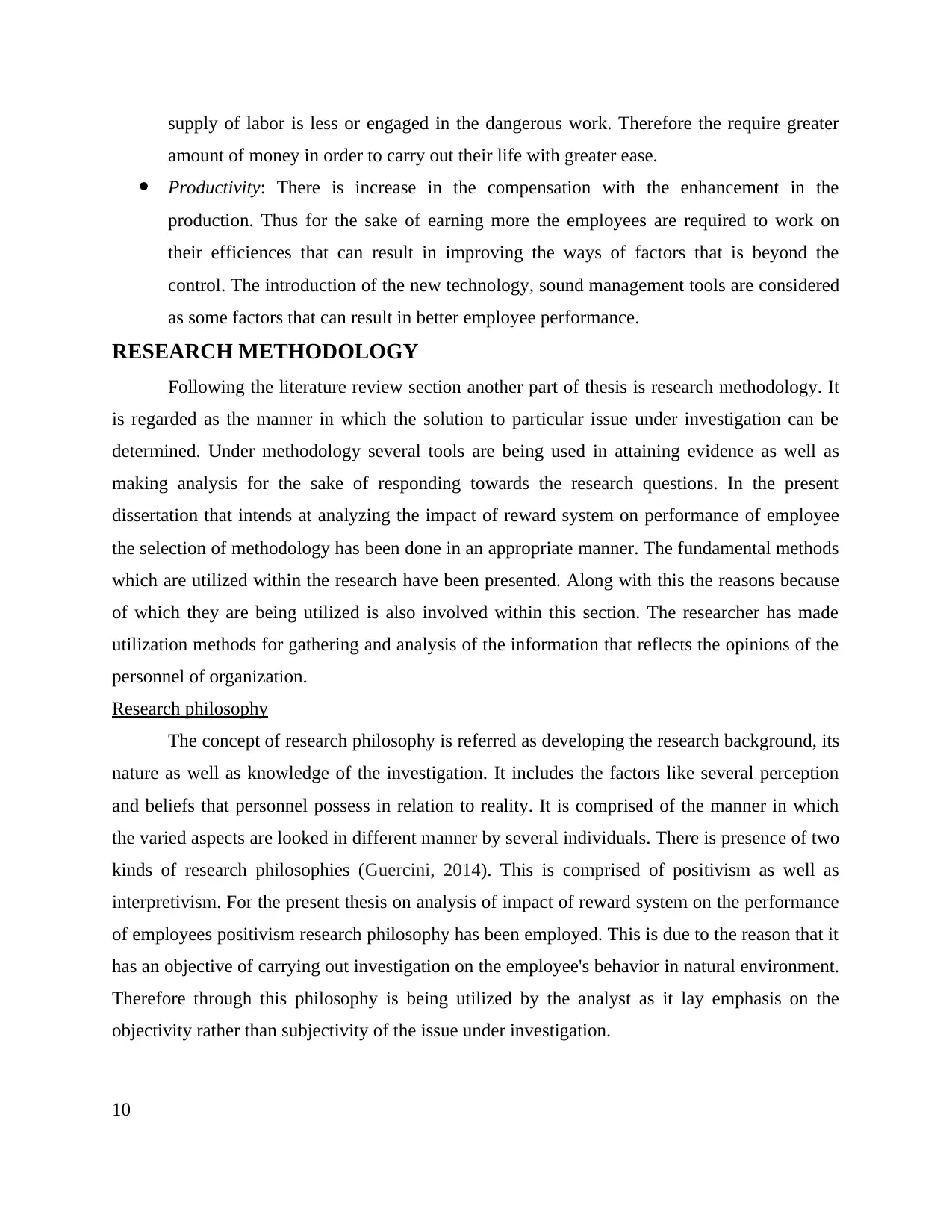
supply of labor is less or engaged in the dangerous work. Therefore the require greater
amount of money in order to carry out their life with greater ease.
Productivity: There is increase in the compensation with the enhancement in the
production. Thus for the sake of earning more the employees are required to work on
their efficiences that can result in improving the ways of factors that is beyond the
control. The introduction of the new technology, sound management tools are considered
as some factors that can result in better employee performance.
RESEARCH METHODOLOGY
Following the literature review section another part of thesis is research methodology. It
is regarded as the manner in which the solution to particular issue under investigation can be
determined. Under methodology several tools are being used in attaining evidence as well as
making analysis for the sake of responding towards the research questions. In the present
dissertation that intends at analyzing the impact of reward system on performance of employee
the selection of methodology has been done in an appropriate manner. The fundamental methods
which are utilized within the research have been presented. Along with this the reasons because
of which they are being utilized is also involved within this section. The researcher has made
utilization methods for gathering and analysis of the information that reflects the opinions of the
personnel of organization.
Research philosophy
The concept of research philosophy is referred as developing the research background, its
nature as well as knowledge of the investigation. It includes the factors like several perception
and beliefs that personnel possess in relation to reality. It is comprised of the manner in which
the varied aspects are looked in different manner by several individuals. There is presence of two
kinds of research philosophies (Guercini, 2014). This is comprised of positivism as well as
interpretivism. For the present thesis on analysis of impact of reward system on the performance
of employees positivism research philosophy has been employed. This is due to the reason that it
has an objective of carrying out investigation on the employee's behavior in natural environment.
Therefore through this philosophy is being utilized by the analyst as it lay emphasis on the
objectivity rather than subjectivity of the issue under investigation.
10
amount of money in order to carry out their life with greater ease.
Productivity: There is increase in the compensation with the enhancement in the
production. Thus for the sake of earning more the employees are required to work on
their efficiences that can result in improving the ways of factors that is beyond the
control. The introduction of the new technology, sound management tools are considered
as some factors that can result in better employee performance.
RESEARCH METHODOLOGY
Following the literature review section another part of thesis is research methodology. It
is regarded as the manner in which the solution to particular issue under investigation can be
determined. Under methodology several tools are being used in attaining evidence as well as
making analysis for the sake of responding towards the research questions. In the present
dissertation that intends at analyzing the impact of reward system on performance of employee
the selection of methodology has been done in an appropriate manner. The fundamental methods
which are utilized within the research have been presented. Along with this the reasons because
of which they are being utilized is also involved within this section. The researcher has made
utilization methods for gathering and analysis of the information that reflects the opinions of the
personnel of organization.
Research philosophy
The concept of research philosophy is referred as developing the research background, its
nature as well as knowledge of the investigation. It includes the factors like several perception
and beliefs that personnel possess in relation to reality. It is comprised of the manner in which
the varied aspects are looked in different manner by several individuals. There is presence of two
kinds of research philosophies (Guercini, 2014). This is comprised of positivism as well as
interpretivism. For the present thesis on analysis of impact of reward system on the performance
of employees positivism research philosophy has been employed. This is due to the reason that it
has an objective of carrying out investigation on the employee's behavior in natural environment.
Therefore through this philosophy is being utilized by the analyst as it lay emphasis on the
objectivity rather than subjectivity of the issue under investigation.
10
Paraphrase This Document
Need a fresh take? Get an instant paraphrase of this document with our AI Paraphraser
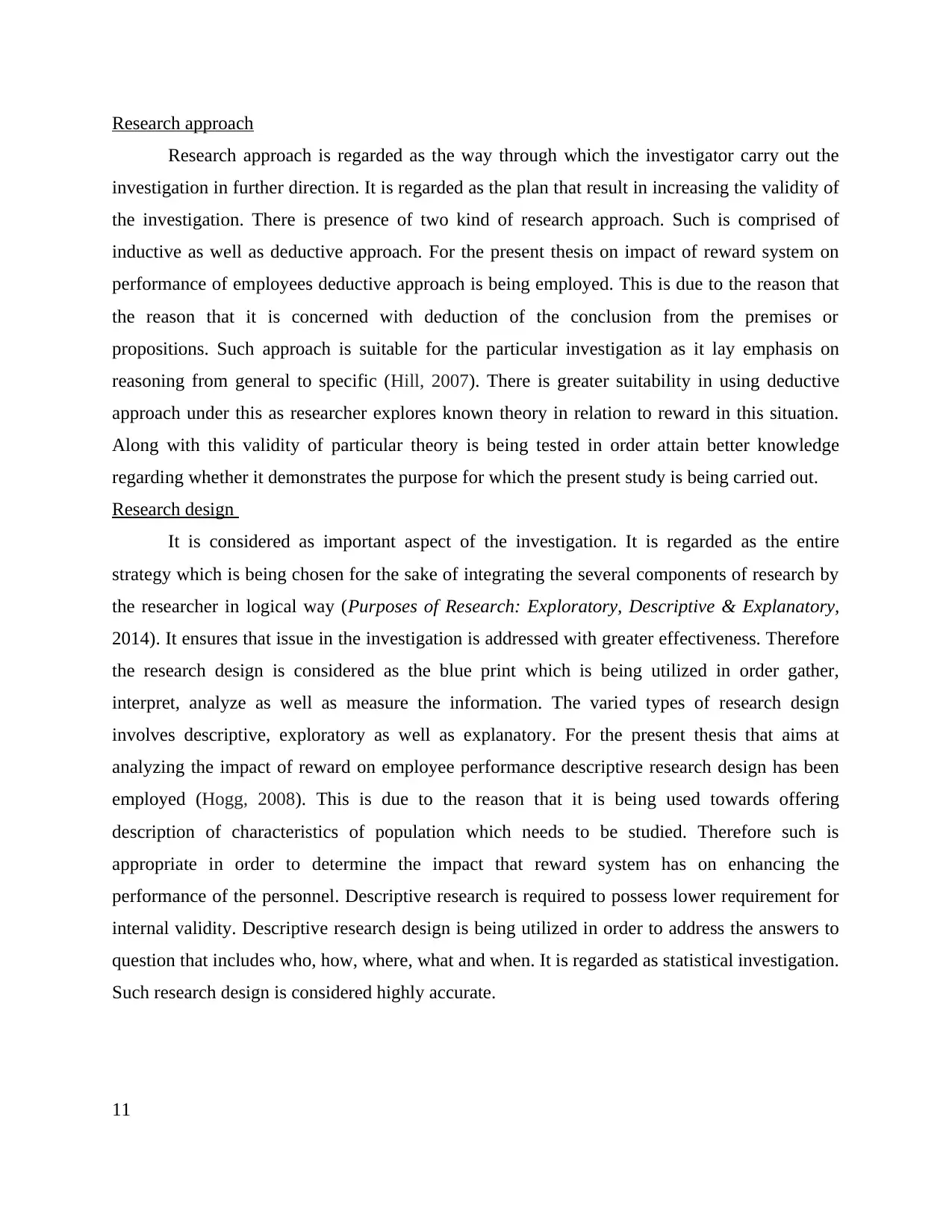
Research approach
Research approach is regarded as the way through which the investigator carry out the
investigation in further direction. It is regarded as the plan that result in increasing the validity of
the investigation. There is presence of two kind of research approach. Such is comprised of
inductive as well as deductive approach. For the present thesis on impact of reward system on
performance of employees deductive approach is being employed. This is due to the reason that
the reason that it is concerned with deduction of the conclusion from the premises or
propositions. Such approach is suitable for the particular investigation as it lay emphasis on
reasoning from general to specific (Hill, 2007). There is greater suitability in using deductive
approach under this as researcher explores known theory in relation to reward in this situation.
Along with this validity of particular theory is being tested in order attain better knowledge
regarding whether it demonstrates the purpose for which the present study is being carried out.
Research design
It is considered as important aspect of the investigation. It is regarded as the entire
strategy which is being chosen for the sake of integrating the several components of research by
the researcher in logical way (Purposes of Research: Exploratory, Descriptive & Explanatory,
2014). It ensures that issue in the investigation is addressed with greater effectiveness. Therefore
the research design is considered as the blue print which is being utilized in order gather,
interpret, analyze as well as measure the information. The varied types of research design
involves descriptive, exploratory as well as explanatory. For the present thesis that aims at
analyzing the impact of reward on employee performance descriptive research design has been
employed (Hogg, 2008). This is due to the reason that it is being used towards offering
description of characteristics of population which needs to be studied. Therefore such is
appropriate in order to determine the impact that reward system has on enhancing the
performance of the personnel. Descriptive research is required to possess lower requirement for
internal validity. Descriptive research design is being utilized in order to address the answers to
question that includes who, how, where, what and when. It is regarded as statistical investigation.
Such research design is considered highly accurate.
11
Research approach is regarded as the way through which the investigator carry out the
investigation in further direction. It is regarded as the plan that result in increasing the validity of
the investigation. There is presence of two kind of research approach. Such is comprised of
inductive as well as deductive approach. For the present thesis on impact of reward system on
performance of employees deductive approach is being employed. This is due to the reason that
the reason that it is concerned with deduction of the conclusion from the premises or
propositions. Such approach is suitable for the particular investigation as it lay emphasis on
reasoning from general to specific (Hill, 2007). There is greater suitability in using deductive
approach under this as researcher explores known theory in relation to reward in this situation.
Along with this validity of particular theory is being tested in order attain better knowledge
regarding whether it demonstrates the purpose for which the present study is being carried out.
Research design
It is considered as important aspect of the investigation. It is regarded as the entire
strategy which is being chosen for the sake of integrating the several components of research by
the researcher in logical way (Purposes of Research: Exploratory, Descriptive & Explanatory,
2014). It ensures that issue in the investigation is addressed with greater effectiveness. Therefore
the research design is considered as the blue print which is being utilized in order gather,
interpret, analyze as well as measure the information. The varied types of research design
involves descriptive, exploratory as well as explanatory. For the present thesis that aims at
analyzing the impact of reward on employee performance descriptive research design has been
employed (Hogg, 2008). This is due to the reason that it is being used towards offering
description of characteristics of population which needs to be studied. Therefore such is
appropriate in order to determine the impact that reward system has on enhancing the
performance of the personnel. Descriptive research is required to possess lower requirement for
internal validity. Descriptive research design is being utilized in order to address the answers to
question that includes who, how, where, what and when. It is regarded as statistical investigation.
Such research design is considered highly accurate.
11
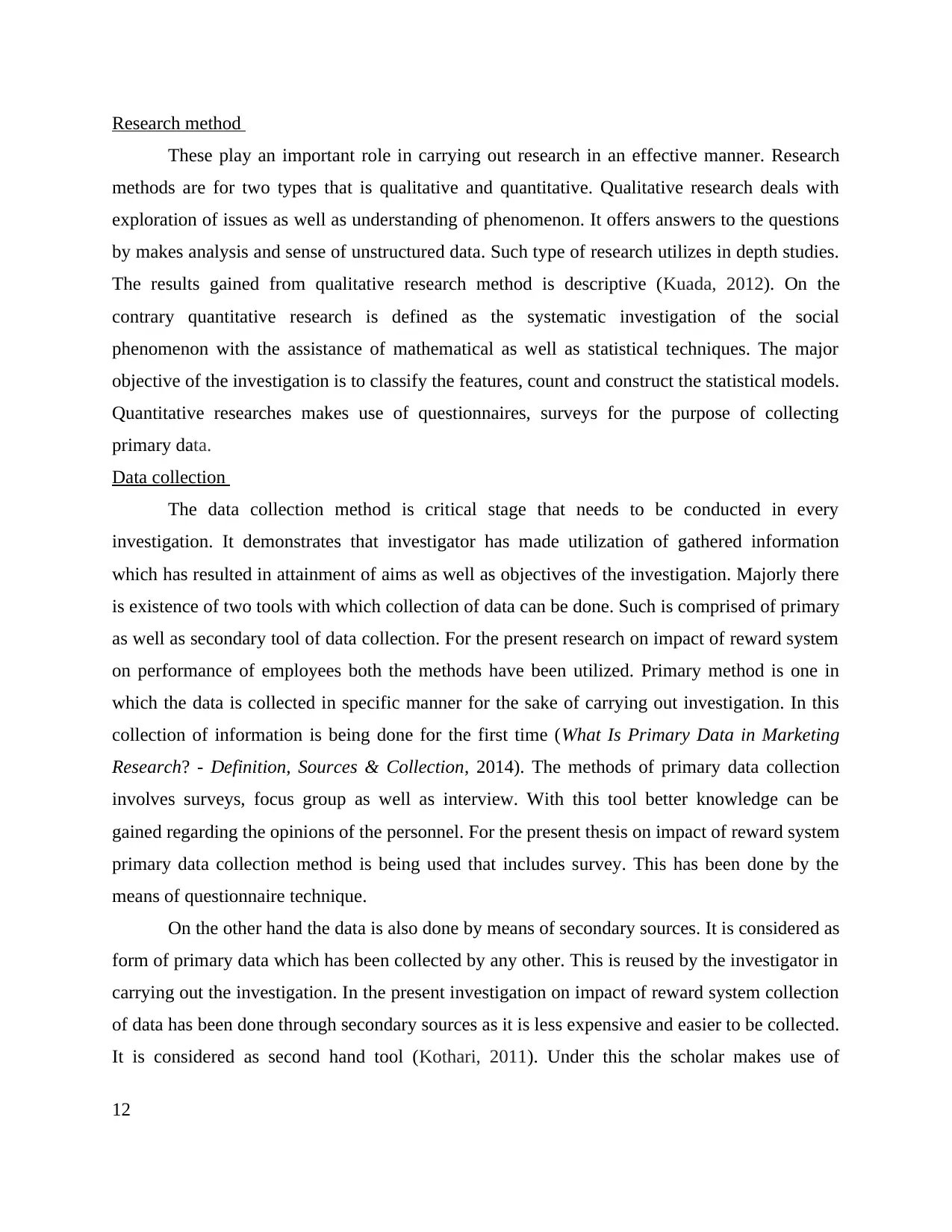
Research method
These play an important role in carrying out research in an effective manner. Research
methods are for two types that is qualitative and quantitative. Qualitative research deals with
exploration of issues as well as understanding of phenomenon. It offers answers to the questions
by makes analysis and sense of unstructured data. Such type of research utilizes in depth studies.
The results gained from qualitative research method is descriptive (Kuada, 2012). On the
contrary quantitative research is defined as the systematic investigation of the social
phenomenon with the assistance of mathematical as well as statistical techniques. The major
objective of the investigation is to classify the features, count and construct the statistical models.
Quantitative researches makes use of questionnaires, surveys for the purpose of collecting
primary data.
Data collection
The data collection method is critical stage that needs to be conducted in every
investigation. It demonstrates that investigator has made utilization of gathered information
which has resulted in attainment of aims as well as objectives of the investigation. Majorly there
is existence of two tools with which collection of data can be done. Such is comprised of primary
as well as secondary tool of data collection. For the present research on impact of reward system
on performance of employees both the methods have been utilized. Primary method is one in
which the data is collected in specific manner for the sake of carrying out investigation. In this
collection of information is being done for the first time (What Is Primary Data in Marketing
Research? - Definition, Sources & Collection, 2014). The methods of primary data collection
involves surveys, focus group as well as interview. With this tool better knowledge can be
gained regarding the opinions of the personnel. For the present thesis on impact of reward system
primary data collection method is being used that includes survey. This has been done by the
means of questionnaire technique.
On the other hand the data is also done by means of secondary sources. It is considered as
form of primary data which has been collected by any other. This is reused by the investigator in
carrying out the investigation. In the present investigation on impact of reward system collection
of data has been done through secondary sources as it is less expensive and easier to be collected.
It is considered as second hand tool (Kothari, 2011). Under this the scholar makes use of
12
These play an important role in carrying out research in an effective manner. Research
methods are for two types that is qualitative and quantitative. Qualitative research deals with
exploration of issues as well as understanding of phenomenon. It offers answers to the questions
by makes analysis and sense of unstructured data. Such type of research utilizes in depth studies.
The results gained from qualitative research method is descriptive (Kuada, 2012). On the
contrary quantitative research is defined as the systematic investigation of the social
phenomenon with the assistance of mathematical as well as statistical techniques. The major
objective of the investigation is to classify the features, count and construct the statistical models.
Quantitative researches makes use of questionnaires, surveys for the purpose of collecting
primary data.
Data collection
The data collection method is critical stage that needs to be conducted in every
investigation. It demonstrates that investigator has made utilization of gathered information
which has resulted in attainment of aims as well as objectives of the investigation. Majorly there
is existence of two tools with which collection of data can be done. Such is comprised of primary
as well as secondary tool of data collection. For the present research on impact of reward system
on performance of employees both the methods have been utilized. Primary method is one in
which the data is collected in specific manner for the sake of carrying out investigation. In this
collection of information is being done for the first time (What Is Primary Data in Marketing
Research? - Definition, Sources & Collection, 2014). The methods of primary data collection
involves surveys, focus group as well as interview. With this tool better knowledge can be
gained regarding the opinions of the personnel. For the present thesis on impact of reward system
primary data collection method is being used that includes survey. This has been done by the
means of questionnaire technique.
On the other hand the data is also done by means of secondary sources. It is considered as
form of primary data which has been collected by any other. This is reused by the investigator in
carrying out the investigation. In the present investigation on impact of reward system collection
of data has been done through secondary sources as it is less expensive and easier to be collected.
It is considered as second hand tool (Kothari, 2011). Under this the scholar makes use of
12
⊘ This is a preview!⊘
Do you want full access?
Subscribe today to unlock all pages.

Trusted by 1+ million students worldwide
1 out of 16
Related Documents
Your All-in-One AI-Powered Toolkit for Academic Success.
+13062052269
info@desklib.com
Available 24*7 on WhatsApp / Email
![[object Object]](/_next/static/media/star-bottom.7253800d.svg)
Unlock your academic potential
Copyright © 2020–2025 A2Z Services. All Rights Reserved. Developed and managed by ZUCOL.





